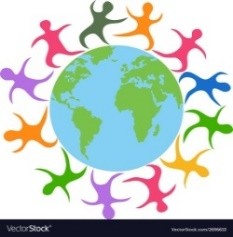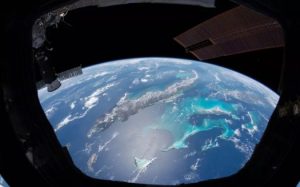IN A NUTSHELL Editor's NoteBy PEAH acknowledged partner Dr. George Lueddeke an announcement here relating to the terms of reference of underpinning 1 HOPE-TDR project implementation proposals. These are presently being evolved across several regions- Africa, Americas, Asia and Europe (with Middle East and Oceania engagement planned later this year). The announcement may be timely in terms of current international uncertainties and unprecedented challenges
Implementing the
International One Health for One Planet Education &
Transdisciplinary Research Initiative
(1 HOPE-TDR)
“CULTIVATING AN ACTIVE CARE FOR THE WORLD AND WITH THOSE WITH WHOM WE SHARE IT”
(UNESCO)
TERMS OF REFERENCE
1 HOPE-TDR Project Implementation Planning Teams
(Africa, Americas, Asia, Europe, Middle East, Oceania)
1.0 Preamble
After billions of years of evolution, in just a few decades we have come to an inevitable turning-point. While we have made significant scientific / technological progress, we have failed to safeguard life on the planet including ours (we are but one of about 8.5 million species).
Naturalist and broadcaster Sir David Attenborough reminds us: “The truth is: the natural world is changing. And we are totally dependent on that world. It provides our food, water and air. It is the most precious thing we have, and we need to defend it.”
It is evident that many lessons history has taught us over millennia have not been learned. While we have the cognitive and affective capacities for achieving a more harmonious world, we continue to have a two-dimensional rather than a three-dimensional view or “orbital perspective”: recognizing the complexity and interconnectedness of all life on the planet.
Global sustainability depends on ensuring that our human needs are compatible with those of our ecosystems – air, land, sea. This re-orientation necessitates “rising above the many issues that divide us and being part of something bigger” – shifting our worldview from human-centrism (‘it’s all about us’) to embracing the ‘common good’ and global sustainability through eco-centrism (‘it’s about all species in a shared environment’).
The One Health (and Wellbeing) concept (OHW) recognises the interconnection of all life in a shared environment and has emerged as a fundamental construct to better understand the complex and unprecedented challenges facing us and finding viable and sustainable ways to address these. As one example, the One Health High-Level Expert Panel (OHHLEP -UN FAO, UNEP, WHO, WOAH*) is committed to One Health as “an integrated, unifying approach that aims to sustainably balance and optimise the health of humans, domestic and wild animals, plants and the wider environment (including ecosystems).”
Complementing the latter and informed by other system-wide initiatives, 1 HOPE-TDR also considers the wider context – drawing, as examples, on Earth Charter International principles and values, the UN-2030 Sustainable Development Goals (SDGs), USAID –“extending assistance to countries recovering from disaster, escaping from poverty and engaging in democratic reforms,” and P4H– “a global network for social health protection and health financing” with a view to gaining a better understanding of the root causes of the existential risks facing us along with finding short and longer-term solutions to help optimise global sustainability.
As former UN Secretary-General Ban-ki Moon reminded us: “There is no Plan B, because we do not have a Planet B”. “New ways of thinking, learning and human engagement are no longer an option but a necessity as is cultivating “an active care for the world and with those with whom we share it” (UNESCO).
*FAO-UN Food and Agriculture Organisation, UNEP- Environmental Programme, WHO-World Health Organisation, WOAH-World Organisation for Animal Health
2.0 1 HOPE-TDR OVERVIEW
Mission
The 1 HOPE-TDR initiative (IPR) refers to an evolving global network and an inclusive learning strategy. Its main aim is to support global sustainability by helping society to better understand the criticality of our relationship to each other, to other species, and to the environment to achieve “a more just, sustainable. and peaceful world.”
Rationales
The major problems of our time from climate change to biodiversity loss to inequities and geopolitical conflicts necessitate a change in our worldview shifting from our predominant human-centric mindset (‘it’s all about us’) to eco-centrism (‘it’s about all species and sustaining our ‘blue planet’!).
Origin
1 HOPE-TDR stemmed from the publication, Survival: One Health, One Planet, One Future (2019/2020), including ‘Ten Propositions for Global Sustainability.’
Proposition #7
calls for “the unifying One Health and Wellbeing concept (OHW) –
‘recognising the interdependence of humans, non-humans, and plants in a shared environment to be the cornerstone of education, research and societal institutions.’
By extension and application, the OHW concept/approach provides a strategic cohesive bond or glue that reinforces the interlinkages of all UN-2030 Sustainable Development Goals (SDGs) -targets and strategies -underpinned by the UN aim to achieve a “more just, peaceful and sustainable world.”
Preparation of 1 HOPE-TDR Project Proposals
(Africa, Americas, Asia and Europe, Middle East, Oceania)
Further to discussions and developments to date, including 1 Hope-TDR in a Nutshell, project planning team members* are asked to prepare capacity-building project proposals that focus on global sustainability informed by the implementation of 1 HOPE-TDR strategies at sub-regional and by extrapolation regional levels.
New ways of thinking, learning and human engagement are key for capacity-building and global sustainability challenging our institutions and society to shift –
- from human health to paying equal attention to the health & wellbeing of all life and ecosystems
- from silos to multisectoral collaboration and transdisciplinary (knowledge and perspectives).
- from individualism to learning from and with others.
- from knowledge fragmentation to integrative learning across all disciplines.
- from knowledge transmission to collaborative knowledge discovery.
- from mainly institution-focus to more direct community engagement and social learning.
- from vested interests, ambition, power to altruism, understanding, compassion and truth
Other principles and values:
- Compassion for the sanctity of all life
- Inclusivity –“leaving no one behind” : all life!
(UNSDG and Survival: One Health, One Planet, One Future)
- Ownership: regions ‘develop their own context – specific approach’
- Planet ‘stewardship and the responsibility of humans to change behaviour’
(One Health High Level Expert Panel)
3.0 1 HOPE-TDR Project Proposal Developments – Coordination
Recommended membership composition – demonstrated expertise in field of study, community/govt/ business leadership and commitment to OHW & SDGs values and principles)
Contributing to the development of 1 HOPE-TDR project proposals (sub-regions)
Universities / Colleges/ Schools
Sub-Regional Co-chairs – 2-tbc)
Membership (3 from each discipline area – 9 [equity and parity])
- Biological/Life Sciences (Medicine: veterinary & human and from such areas as public health, global health, biology, environmental science, agricultural science, ecology…).
- Natural / Physical Sciences (Earth sciences and from such areas as chemistry, physics, geography, manufacturing, mechanics…).
- Social Sciences & Humanities (Education-Primary/Secondary / Associations/Teacher Training and from such areas as politics, economics, sociology, psychology, cultural anthropology…)
Affiliate Organisations
Membership (2 from each sector-8-tbc)
- Civil Society, Government, Business and Partner Organisations focusing on planet sustainability
Advisory (tbc)
4.0 Suggested 1 HOPE-TDR Initiative Implementation
Project Development Phases
- Establish sub-regional consortia (steering and coordinating committees with representatives from sub-regions to enable strategic developments. (2025)
- Establish sub-regional country coordinating committees – participating institutions / organisations – to develop and take forward strategic developments especially localising initiatives. (2026)
- Establish regional ‘hubs’ to support #1 and #2 and liaise with global organisations. (2027)
- Evaluate #1- #3 and formulate recommendations (2027)
5.0 General Strategies
- Mainstream OHW and the SDGs across societal sectors (education, research & innovation; workforce developments-health systems, govt. policy, business, community (esp. focusing on Youth/GenZ Engagement, Empowering Women & Disenfranchised)
- Strengthen multi-sector collaboration and solutions by enabling OHW and the SDGs
- Promote a future consciousness and accelerate preventive approaches identifying root causes and addressing global risks (e.g., climate change, peace and security, governance / accountability, AI…)
- Provide synergies/alignment to allow different global regions to exchange knowledge and fact-based information on pressing socio-ecological development challenges under global and regional stressors.
- Contribute to an international 1 HOPE-TDR advisory forum to guide and support strategic directions including “re-conceptualization of the university/higher education purpose and scope focusing on the development of an interconnected ecological knowledge system with a concern for the whole Earth – and beyond.”
For queries or further information: Contact George Lueddeke PhD Global Lead, international One Health for One Planet Education and Transdisciplinary Research initiative (1 HOPE-TDR) (glueddeke@aol.com)

